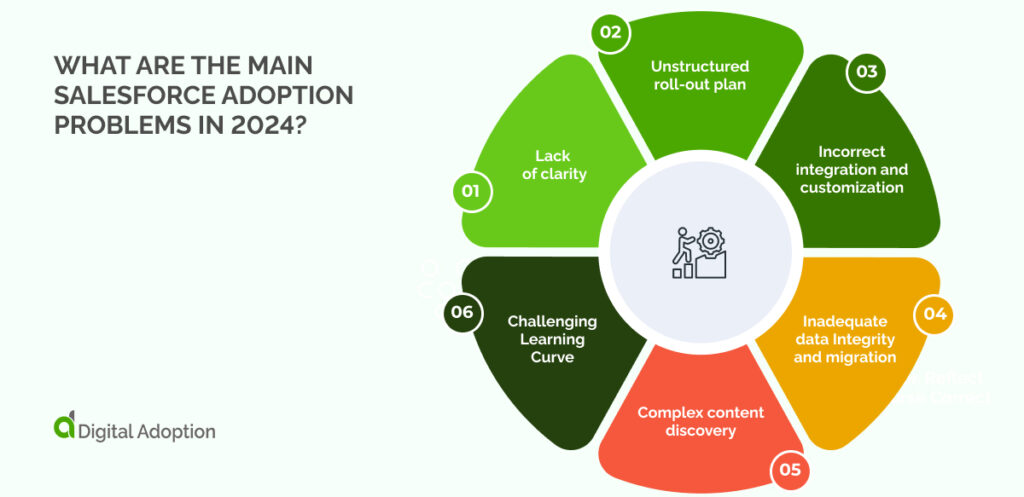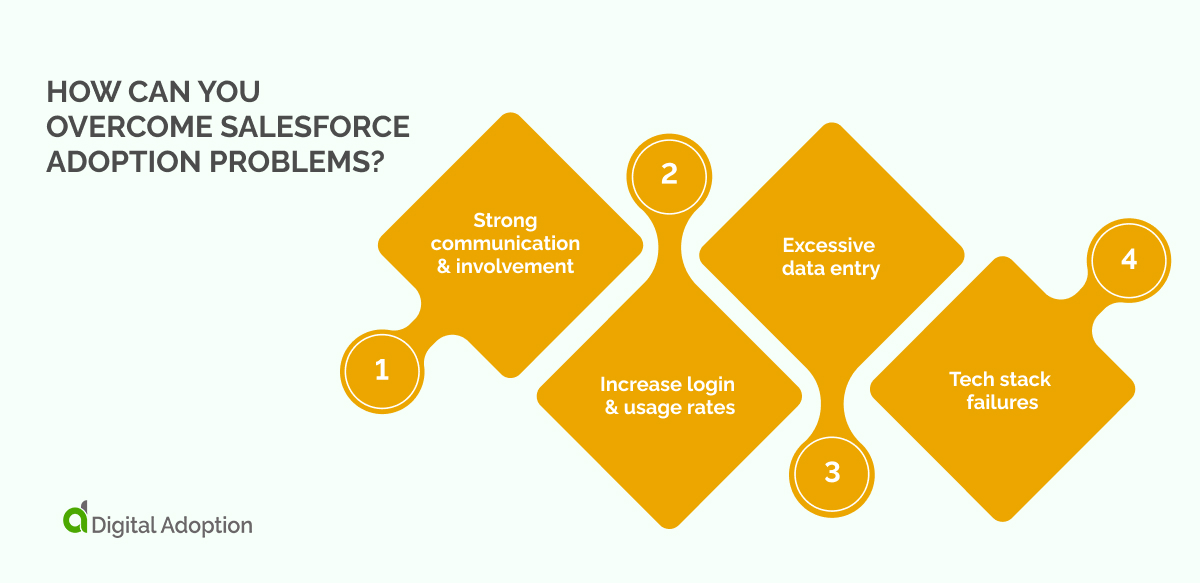Trust us; your organization will fail following low user adoption of new technologies.
The challenge is that, however positively your sales managers and reps feel about their employer, they are often afraid of change and how new additions to the company’s tech stack will impact their role.
The Salesforce platform is no exception to this rule of digital adoption, being the core of success when using the software effectively and for the best ROI as you improve Salesforce user adoption via effective software implementation.
When you carefully consider Salesforce adoption problems, it becomes easier to see the solutions and work alongside your staff to support them in achieving high user adoption rates and high ROI as part of a successful Salesforce implementation.
This article will explore effective solutions for tackling the main Salesforce adoption problems. We delve into why these issues are significant, identify the primary problems, discuss barriers hindering solutions, and provide strategies for overcoming Salesforce adoption challenges.
Why are Salesforce adoption problems significant?
It’s challenging to adopt new technology.
Salesforce is no exception to this rule because digital transformation efforts must continuously adapt and incorporate new and existing digital tools. Still, sales reps, like any other employees, often resist change as this is part of human nature.
To overcome this challenge, business and IT leaders must adapt their change management approach to support staff to adopt Salesforce effectively and efficiently.
However, several Salesforce user adoption issues stand in the way of effective adoption which we will now explore.
What are the main Salesforce adoption problems?

Adopting Salesforce involves not only updating technology but also shifting company culture.
It is essential to have a comprehensive strategy that tackles the main Salesforce adoption problems to ensure a seamless transition.
Lack of clarity
To successfully move from your current CRM to Salesforce, it’s essential to fully comprehend the features and disparities between the systems and recognize areas for improvement.
A lack of understanding may hinder your ability to persuade your team to embrace Salesforce. Your communication plan should clearly outline the rationale for implementing Salesforce and convey the advantages it will offer to your employees.
Unstructured roll-out plan
It’s better for your organization to implement a phased rollout strategy instead of a full rollout to increase the likelihood of success. Doing so involves setting clear project timelines and beginning with a pilot group.
Doing this lets you determine what works well for the pilot group and then scale up for other employees accordingly.
Incorrect integration and customization
Before launching Salesforce, customize and integrate the platform according to your requirements.
Salesforce is a highly customizable and interoperable platform, so setting it up is essential to avoid hindering your workforce’s productivity and efficient user adoption after the launch.
Inadequate data Integrity and migration
Salesforce relies on quality data for optimal performance, and it is essential to ensure data accuracy during data migration to avoid poor results, as reliable and up-to-date data is crucial for users to obtain valuable insights from Salesforce.
It is also important to note that data quality is influenced by both user inputs and validation, impacting user adoption. Remember the principle of “garbage in, garbage out.”
Complex content discovery
Making sure your teams use a complex application like Salesforce can be challenging. They may opt for legacy software if searching for information takes too long.
To prevent this, prioritize easy access to information and automate processes to simplify the use of Salesforce for your teams.
Challenging Learning Curve
Becoming a Salesforce expert requires weeks of continuous training, including self-learning and instructor-led sessions. The time it takes to learn depends on how customized your instance is and how you intend to use it.
However, even with this Salesforce training, you will not be guaranteed to become an expert, as it can be challenging to remember the flow and clicks necessary to execute tasks.
How can you overcome Salesforce adoption problems?

It is essential to consider how to overcome Salesforce adoption problems in an organized, structured way to ensure your sales reps don’t become frustrated and can understand the value of Salesforce and how to utilize it.
1. Strong communication & involvement
Sales may wonder what to do if their sales team is frustrated due to insufficient involvement in decision-making, inadequate training, and poor communication.
To implement Salesforce as your CRM system, whether replacing an existing one or starting from scratch, follow these steps:
- Gather thoughts and requests at a team meeting.
- Utilize one-to-one meetings to collect individualized feedback user feedback.
- Empower champion users to spearhead training and user onboarding.
2. Increase login & usage rates
Although CRM is a crucial sales technology, it’s important to remember that login and usage rates cannot always be guaranteed 100%, as humans are fallible, which is especially important to consider as a sales manager.
Sales have been reluctant to use or log in to Salesforce due to various reasons for nearly two decades for the following reasons:
- Discomfort when having Salesforce usage data collected.
- Hesitancy toward change.
- Initial impressions of complexity (Salesforce dashboards).
- Salesforce adoption strategy not communicated to all staff.
It is essential to communicate with your sales staff to address these issues and ensure they know what data you will collect and how you will use it to benefit them and the organization.
Salesforce has a variable cost of $25 to $300 per month per user. It’s important to note that low usage rates can significantly affect your reporting to the C-suite.
Your low login and usage rates may highlight two issues:
- Salesforce isn’t streamlining your rep’s digital workflow.
- Salesforce isn’t increasing sales.
Salespeople may find it difficult when they log into Salesforce and come across a long list of unappealing lead, contact, and account records. As a result, it is important to empathize with their situation and find ways to improve their experience within the Salesforce system.
When salespeople access Salesforce, they might encounter a lengthy list of unattractive lead, contact, and account records, making it difficult for them to navigate. Therefore, it’s crucial to understand their predicament and seek methods to enhance their Salesforce experience.
Extending Salesforce functionality to your sales teams can reduce the likelihood of low login and usage rates.
- Your sales representatives can use plug-ins and extensions in their Outlook or Gmail inbox to view Salesforce records while checking their emails.
- Mobile apps are available to assist sales representatives in accessing Salesforce records while on the move and enabling them to make phone calls or send emails.
In addition, you can enable your salespeople to select an AppExchange application that can enhance the efficiency and profitability of their usage of Salesforce.
3. Excessive data entry
Salesforce reports that salespeople spend 166 hours yearly doing data entry, primarily outside regular work hours. This scenario can lead to low morale among salespeople and cause frustration for their partners.
How do you plan to solve the problem where 57% of your sales representatives cannot meet their sales targets each quarter due to the burden of data entry work as a sales manager?
How much more confident would you be if your sales team had over 160 additional hours of selling time per year per sales representative by eliminating data entry tasks?
Use these strategies to achieve this new managerial approach:
- Salesforce automation: Create and update Salesforce records from your inbox or smartphone using just one click.
- Data Enrichment: automatically update records from your data sources like Lead411 and ZoomInfo.
4. Tech stack failures
Multiple tools in your tech stack can lead to complex data flow between one or multiple data sets. This scenario can become challenging to manage in a short period.
This situation can lead to frustration for your sales team and the IT staff responsible for developing and supporting the integrations and data transfers.
The tech stack consists of three layers that data passes through, which are:
- Intelligence layer
- Orchestration layer
- Engagement layer
Simply put, data can become corrupted during the transfer through your technology system, which may result in replacing quality data with outdated or incorrect replacements.
Salesforce users can find it frustrating to realize that their entered data has been altered or misspelled. They might exclaim, “This isn’t the spelling I typed!” or “I spent so much time entering the data, and now it’s all messed up!”
Choosing the best sales software solutions like Salesforce and consolidating your tech stack are two effective ways to maintain a high level of performance for your tech stack and Salesforce integration.
Consolidate your tech stack solutions
Having two apps that share data append or lead routing features is not advisable. You should coordinate with your vendors to activate or deactivate features when there are no more options for consolidation.
Only choose top sales software solutions
If you want to speed up the process, it’s a good idea to eliminate sales tools in your tech stack with poor ratings. These tools may cause data errors or not function as well as expected.
Communicate with staff to tackle Salesforce adoption problems
The significance of Salesforce adoption problems lies in its potential long-term impact on companies. It can hamper sales and customer relationships, disrupt employee morale, and lead to lost revenue if not identified and addressed quickly.
However, with the right Salesforce expertise and strategies like targeted training, smart integration methods, and strategic communication, businesses can decide how to tackle their own set of Salesforce adoption problems.
But above all, you must proactively communicate with your staff to understand what’s working with Salesforce implementation and what is going well.
Communicating with them encourages your staff to take ownership of their unique challenges, ensuring a smoother transition for teams as they get comfortable using the platform.













